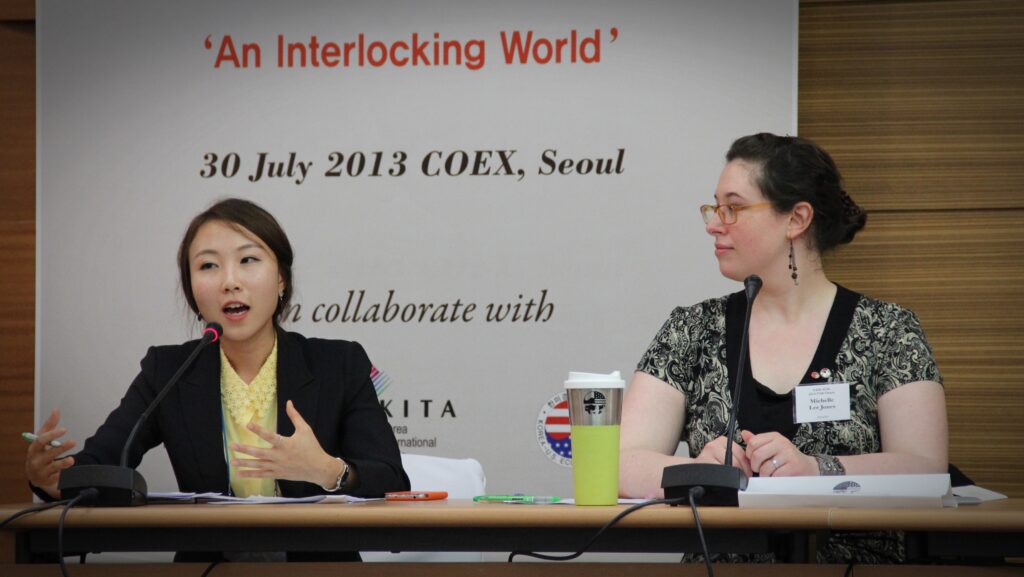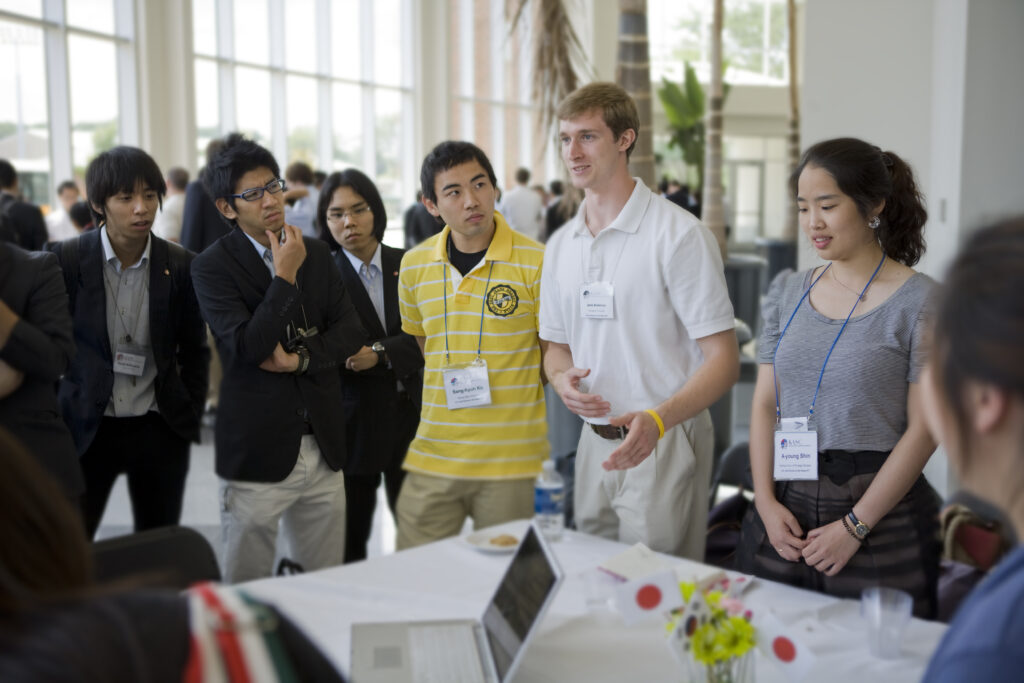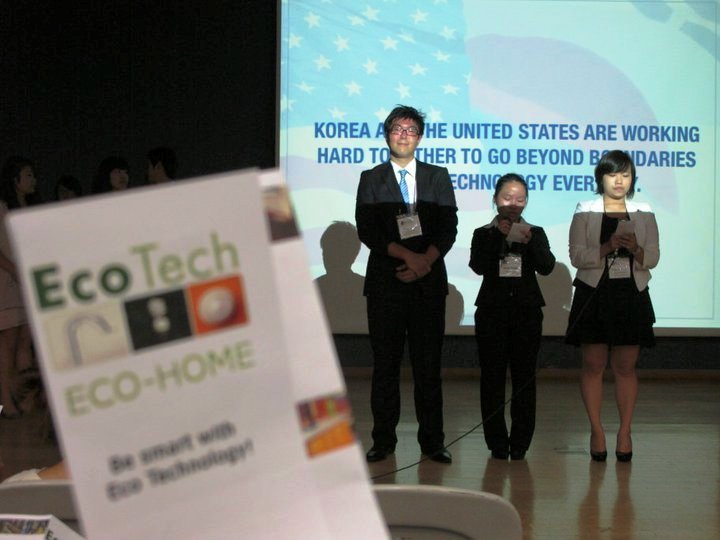
RoundTables
Participating in a Roundtable (RT) is an important part of the KASC experience. American and Korean Delegates have the opportunity to discuss important issues in a smaller group setting and share their personal opinions and experiences with their peers with a spirit of understanding each other’s point of view. These discussions are fairly informal and will naturally become more complex over the course of the conference. As a general timeline, Delegates will broadly explore their RTs in the first week, narrow their focus and determine their topic for Final Forum in the second week, and then jointly develop their final project in the third and final week.
This year’s theme centers around intersections in our rapidly globalizing world. There are many different aspects that combine in current international issues; each of this year’s RT topics include at least two topics that may have previously been considered separate in our education, but must combine in real-life application for us to understand key issues in international politics and diplomacy. It is the goal of KASC17 to help delegates understand how to work collaboratively towards a common goal — researching and communicating a professional presentation or policy while considering multiple different areas of study.
Art and Media
Carve the peg only after you have observed the hole.
Korean proverb
In the dynamic world of arts and media, creativity is infinite. Whether in South Korea or the United States, the power of artistic expression and media innovation resonates deeply in our lives. Art and media are not mere reflections of our societies; they are catalysts for change, sparking emotions, igniting dialogue, and forging connections on a global scale. Each brushstroke, note, or frame carries the potential to shape our careers, daily lives, and the world around us.
Join us in unraveling the contents, methods, and values embedded within the realm of arts and media. Through thoughtful discourse, we’ll illuminate the profound impact of arts and media on our societies and discover how our unique perspectives contribute to this ever-changing landscape.
Questions to Consider:
- What role does art and media play in shaping cultural identities both on a local and global scale?
- Think about a work of art/media (literature, music, film, performance, etc.) that has significantly impacted you and how you think it has influenced others worldwide.
- With the surge of advancing technology on the rise, such as artificial intelligence, blockchain, and virtual reality, how do these technologies affect creativity and the consumption of art?
- As globalization plays a bigger role in today’s society, do you believe artistic expression is becoming generalized or are we finding value in the diversity of cultural creativity?
The Interplay of Business, Law, and Diplomacy in a Global Context

In today’s interconnected world, the intricate relationship between business, diplomacy, and law carries significant implications for international affairs and global markets. This round table aims to untangle this complex web, exploring how shifts in global politics and legal frameworks shape the decisions of multinational corporations and governments.
For instance, recent events like the COVID-19 pandemic and the Ukraine-Russia conflict have prompted nations to reconsider their supply chains, emphasizing self-reliance. We will delve into this further, examining the broader effects of initiatives like the Industrial Resilience Accelerator (IRA), which resonate across regions including Korea.
Through insightful discussions, we will dissect the ways in which these elements converge, investigating how legal considerations intersect with diplomatic strategies to influence business decisions. We will uncover the pivotal role of trade agreements, sanctions, and international treaties in shaping the global economic landscape. Furthermore, we will analyze how corporate choices aligned with diverse legal systems can inadvertently impact diplomatic efforts.
Join this round table to unravel the intricate connections between business, diplomacy, and law on a global scale. Engage in discussions that navigate the complexities of these influences, shedding light on critical junctures where global affairs and commerce intersect, and the resulting implications for our interconnected world.
Questions to Consider:
- In what ways do international treaties, trade agreements, and sanctions impact the strategies and decisions of multinational corporations? Can you provide specific examples of their influence?
- How can the Industrial Resilience Accelerator (IRA) and initiatives like it affect the interconnectedness of global markets and the interplay between business, law, and diplomacy?
- What are the key challenges and opportunities for businesses operating in regions with diverse legal systems? How do these choices impact diplomatic efforts and international relations?
- Can you share insights into how governments and businesses navigate the balance between self-reliance and international cooperation, especially in times of crisis or uncertainty?
Environment and Technology
Look deep into nature, and then you will understand everything better.
Albert Einstein
In the Environment and Technology roundtable, participants will discuss the intersections of environmental issues and technological advancements in our rapidly developing world. These two areas are inherently tied together, wherein the development and usage of technologies affects how much and in what way we impact the environment. Some technologies may cause a significant negative impact on the environment, while others can influence a positive one. Relations between the US and ROK have long collaborated on lots of issues surrounding tech and the natural world – whether that be explicitly or inadvertently – and continue to do so even more today.
During our discussions, delegates will choose a current issue relating to the environment and technology, then will suggest policy that works towards a solution; possible topics to investigate may include nuclear energy, EVs (electric vehicles), renewable energies, SDGs, microchips, infrastructure, and transportation among others.
Questions to Consider:
- How would you define green technology? What are some current events or policies you know of that include green technology in relation to the US and/or ROK?
- What are some current efforts being done by the US and ROK that incorporate green technologies? What efforts are being put into advancements of green technology?
- What are the reasons for which the US and ROK might have interest in further development of green technologies? What is their role on a global scale?
- How is nuclear energy produced? What are the pros and cons of nuclear energy? How does nuclear technology affect the environment?
- Other than the environment, what other aspects of life or society might also affect how we decide to move forward with policy? How do the economic aspects of different technologies affect how we might approach them? For example: microchip manufacturing, nuclear power plant exportation, EVs, etc?
International Relations and Political Science

You have to take ownership and leadership of tomorrow. For that to be possible, you have to strengthen your capacity and widen your vision as a global citizen.
Ban Ki Moon
International relationships are crucial for maintaining global peace, and cooperation, and addressing shared challenges. These relationships encompass treaties, agreements, diplomatic discussions, trade partnerships, and more.
Beginning with government and politics, within the context of the current topic, we’ll delve into some of the key aspects.
In the realm of government and politics, one vital aspect is the formation of alliances and partnerships. Countries establish diplomatic ties to enhance their international standing and to collaborate on issues of common interest. These relationships are often facilitated through treaties and agreements that outline shared goals and commitments.
Questions to Consider
- Why is the US-ROK Alliance important in international relations? What is its most crucial matter?
- From a political and diplomatic perspective, what does the “Washington Declaration” signify?
- What are the roles and influences of the US, ROK, China, and Japan in International relations?
- How can we effectively respond to regional conflicts and security challenges in a world where wars and disputes persist?
Trade and Economic Cooperation
You have to take ownership and leadership of tomorrow. For that to be possible, you have to strengthen your capacity and widen your vision as a global citizen.
Ban Ki Moon
The United States and Republic of Korea have forged a strong partnership for 70 years and now become a great economic alliance. Bilateral trade is a central component of South Korea-U.S. economic cooperation.
One of the milestones is the Korea-U.S. Free Trade Agreement (KORUS FTA). FTA reduces tariffs across various industries and emphasizes intellectual property rights protection and labor. On the other hand, protectionism is a trend around the world. There is a need to explore ways to promote mutual benefits and strengthen economic cooperation.
In the Trade and Economic Cooperation roundtable, participants would look into some of the trade agreements or policies and discuss methods of enhancing the cooperation. The roundtable discussion’s goal is to develop a practical policy.
Questions to Consider
- What is trade protectionism? What makes countries implement trade protectionism policies?
- What are the expected roles of Inflation Reduction Act from the US government perspective?
What are the main contents of the IRA? How can the IRA impact ROK? - What are regionalism and multilateralism? Why do countries seek for regional trade agreements?
- What makes the US and ROK strong ties regarding trade and economics?
- How would the US and ROK economic alliance transform?
Final Forum

The objective of RTs is to jointly identify a specific challenge related to the RT topic and develop a creative and innovative solution. Delegates can expect to complete both a relatively brief written report as well as presentation slides. RT groups will present their research before the rest of the delegation, KASC alumni, and expert panelists who will ask questions and provide feedback. The conference will officially conclude following the Final Forum with a formal Closing Ceremony.